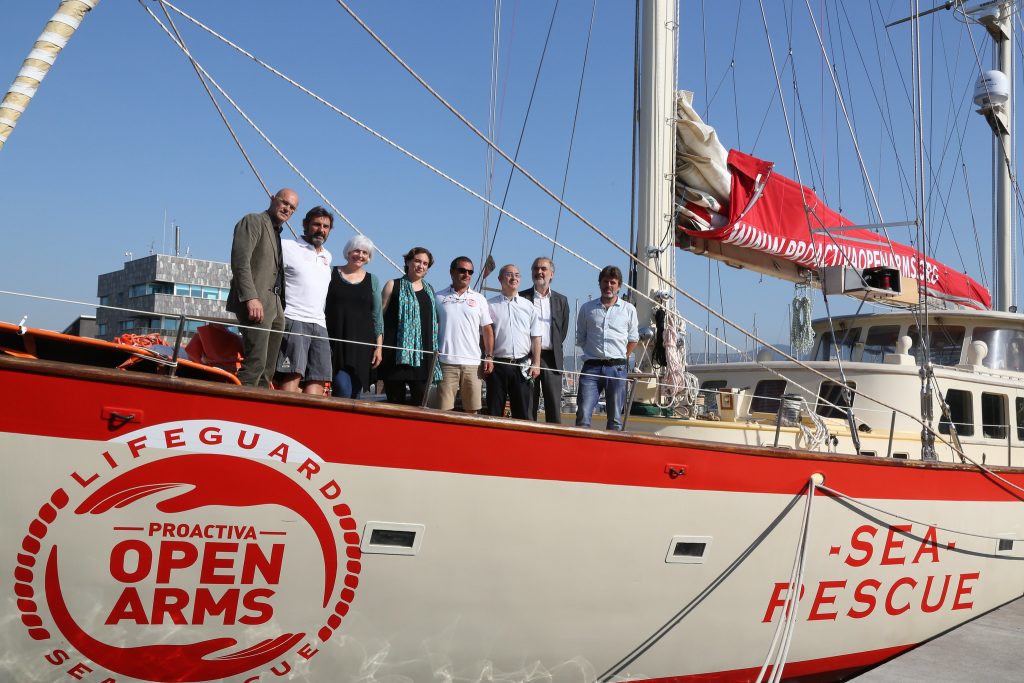 Chloé Brière is a Post-Doctoral Researcher (F.R.S. – F.N.RS) at the Université libre de Bruxelles affiliated to the Centre of European Law and the IEE-ULB. Her research interests include European Criminal Law, EU external relations, EU migration law and the free movement of persons within the European Union.
Chloé Brière is a Post-Doctoral Researcher (F.R.S. – F.N.RS) at the Université libre de Bruxelles affiliated to the Centre of European Law and the IEE-ULB. Her research interests include European Criminal Law, EU external relations, EU migration law and the free movement of persons within the European Union.
What are the prospects for solidarity with migrants in the context of the Open Arms incident in Lampedusa?
Unfortunately, the Open Arms incident in Lampedusa is only one of the latest occurrences of a situation that has repeated itself over the last months, namely whenever a boat that rescued migrants at sea was then forced to wait to disembark them until an agreement was reached between EU Member States regarding their relocation. Just a few days after the Open Arms was allowed to disembark, another boat ‘Ocean Viking’ operated by the NGOs SOS Méditerannée and Doctors without Borders, was facing the same situation and was finally allowed to disembark migrants in Malta.
Such situations have dire consequences for the persons on board, as space is limited, and the boats are not equipped to host so many persons for so long. Some migrants jumped in the water, with and without life-saving jackets, in an attempt to reach the coast, and were saved by Italian coastguards.
Solidarity with migrants is present via the assistance provided by the NGOs operating the boats and rescuing them. The assistance provided on the ground is also a form of solidarity, even though it distinguishes itself as a form of solidarity that can be to a certain extent be provided by public authorities, or under their approval (operation of shelter and rescue centers, provision of medical and psychological care).
Other dimensions of solidarity can be identified, such as for instance the decision of the Spanish government to accept migrants on its territory, and to send a military boat for their travel to Spain.
What can the EU do?
The EU is relatively powerless to address such situations. The principle of solidarity is mentioned in Article 80 TFEU, according to which the EU’s common migration policy shall be governed by the principles of solidarity and fair sharing of responsibilities. Yet this provision refers more to the solidarity among Member States in the fields of border management, asylum and immigration policies. A concrete illustration of this form of solidarity between EU Member States can be found in the establishment of the Emergency Relocation Scheme (ERS), or in the Franco-German proposal for a new “solidarity mechanism”.
What is the responsibility of Member States regarding humanitarian assistance to migrants?
The responsibility of the Member States is two-fold:
- Firstlty, Member States should agree on the implementation of the principle of solidarity between themselves. However, such agreement is unlikely to be achieved, considering the past positions of certain Ministers, such as the former Italian Minister for Interior, Matteo Salvini, or the positions of certain Member States, such as those forming the Visegrad group. In practice, tensions between Member States leads to the challenge before courts of EU instruments (see the cases brought before the CJEU by Hungary and Slovakia against the ERS) and the opening of infringement proceedings against some of them for lack of implementation (see the proceedings opened against cases against Poland (C-715/17), Hungary (C-718/17) and the Czech Republic (C-719/17)).
- Secondly, Member States have a responsibility to clarify the law regarding the possible prosecution of those providing humanitarian assistance to migrants. The EU instruments currently in force, known as the “Facilitators Package”, provide for a possible “humanitarian exemption”, but this possibility remains optional. As a consequence, there are important variations from one Member State to another, especially with regard the prosecution of those rescuing migrants at sea, as it has notably been monitored by the EU Fundamental Rights Agency since 2014 (latest update). The revision of the EU instruments had been raised back in 2015, and it had been the object of a public consultation that received more than 2000 answers. The European Commission conducted an in-depth evaluation, at the end of which it dismissed the need for such revision. In such context, the national legal frameworks are essential to determine whether or not someone providing humanitarian assistance to (or demonstrating solidarity towards) a migrant can be prosecuted.
Interested in this topic? The issue of the criminalization of humanitarian assistance to migrants will be further debated on 21 October 2019 at the occasion of the Agora Forum, organized by the Institute of European Studies. Prof. Anne Weyembergh and Chloé Brière will convene a panel gathering academics, representatives of EU institutions and civil society, and steer the discussions towards the formulation of policy recommendations. The event is part of the Jean Monnet Centre of Excellence project coordinated by the IEE-ULB.
Brière participated recently in the European Union in European Affairs conference #EUEA19 in the panel “Solidarity in the Context of Migration: An Unachievable Objective?”




